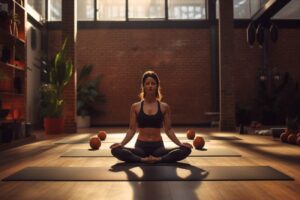If you’re on a quest to discover a harmonious balance between your mind and body, you may find your answer in the world of yin yoga. This ancient practice combines the principles of yin and yang, creating a unique and tranquil experience that can help you achieve physical and mental equilibrium.
The essence of yin yoga
Yin yoga, unlike its more dynamic counterpart, yang yoga, is a slower-paced practice that focuses on holding poses for an extended period. These poses, also known as asanas, target the deep connective tissues of the body, such as ligaments, tendons, and fascia. The primary goal is to increase flexibility and release tension, leading to a more balanced and relaxed state of being.
Yin and yang philosophy
Yin and yang are fundamental concepts in Chinese philosophy, representing the dualistic nature of existence. Yin embodies qualities like stillness, receptivity, and darkness, while yang represents qualities of action, strength, and light. In yin yoga, these opposing forces are harnessed to create a sense of equilibrium.
The practice of yin yoga
Yin yoga sessions are typically longer, with each pose held for several minutes, allowing practitioners to delve deep into relaxation and meditation. This extended duration promotes the release of tension and fosters a profound sense of tranquility. The practice can be quite challenging, as it requires you to remain still and patient, often pushing your boundaries of comfort.
The key principles of yin yoga
Incorporating yin yoga into your routine involves a few essential principles:
- Find your edge: Each pose should be practiced to your limit, but not beyond, respecting your body’s boundaries.
- Hold poses: Poses should be held for 3 to 5 minutes or even longer, depending on your skill level.
- Breathe mindfully: Deep and conscious breathing plays a pivotal role in yin yoga, helping you stay present and relaxed.
- Release and relax: After holding a pose, there’s a brief relaxation phase that allows you to sense the effects on your body.
The benefits of yin yoga
Yin yoga offers a myriad of advantages, both for the body and the mind. Some of the key benefits include:
- Improved flexibility and joint mobility
- Stress reduction and enhanced relaxation
- Better posture and body awareness
- Balancing of energy and emotions
- Enhanced meditation and mindfulness skills
Yin yoga and mind-body connection
The essence of yin yoga lies in its ability to bridge the gap between the physical and the mental. It encourages introspection and self-awareness, allowing you to explore the inner workings of your mind while nurturing your body. This holistic approach makes it a potent tool for achieving harmony in your life.
Yin yang yoga: finding equilibrium
Yin yang yoga is a hybrid practice that combines the elements of both yin and yang styles. It emphasizes the need for balance between effort and ease, strength and flexibility. This fusion of opposing forces aims to provide a well-rounded and harmonious experience for practitioners.
Discovering the balance
Yin yang yoga encourages you to strike a balance in all aspects of your life. It promotes physical health, mental clarity, and emotional stability, ultimately helping you find equilibrium within yourself and in the world around you. This harmony extends beyond the yoga mat, impacting your daily life and interactions with others.
Frequently asked questions
What’s the difference between yin yoga and yang yoga?
Yin yoga is a slow-paced practice that focuses on holding poses for an extended period to target connective tissues. Yang yoga, on the other hand, is more dynamic, emphasizing movement and muscle engagement.
Can beginners practice yin yoga?
Yes, beginners can practice yin yoga, but it’s important to start slowly and listen to your body. Over time, you can increase the duration of your poses and deepen your practice.
How often should i practice yin yoga?
The frequency of your yin yoga practice depends on your goals and schedule. Many people find benefit in practicing a few times a week, while others may incorporate it into their daily routine for maximum results.
Is yin yoga suitable for everyone?
Yin yoga is generally safe for most individuals, but it’s essential to consult with a healthcare professional if you have any underlying medical conditions. Additionally, pregnant individuals or those with specific injuries should approach yin yoga with caution and seek guidance from a qualified instructor.
Embark on your journey to balance and tranquility with yin yoga, and explore the harmonious blend of yin and yang. This ancient practice offers a path to self-discovery, improved well-being, and a profound sense of equilibrium.
Zobacz także:




